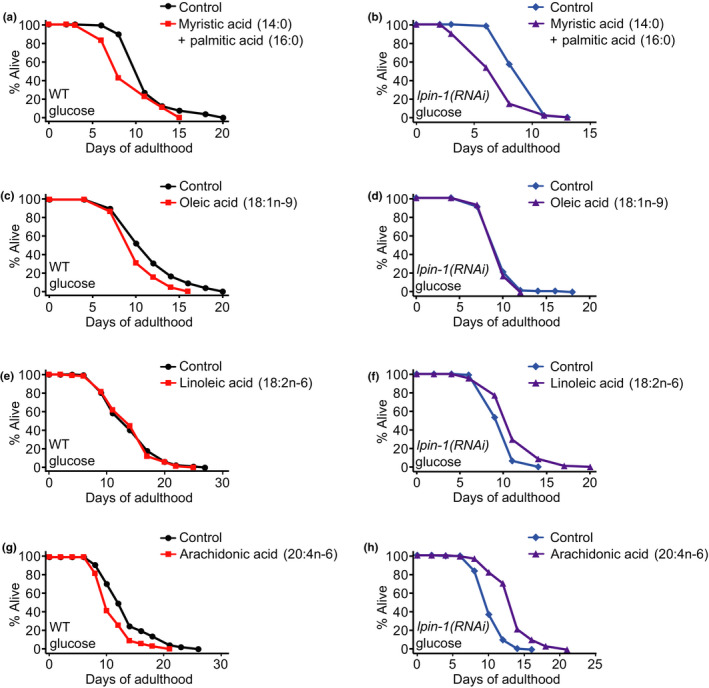FIGURE 6.

Supplementation with ω‐6 polyunsaturated fatty acids suppresses the short lifespan of glucose‐fed lpin‐1(RNAi) worms. (a, b) Supplementation of saturated fatty acid (SFA) mixture of myristic acid (14:0) and palmitic acid (16:0) did not prevent the life‐shortening effects of glucose‐rich diets in control(RNAi) (WT) (a) or lpin‐1(RNAi) worms (b). (c, d) Oleic acid (18:1n‐9) feeding decreased the lifespan of glucose‐fed WT (c) and did not affect that of lpin‐1(RNAi) worms on glucose diets (d). (e, f) Supplementation with linoleic acid (18:2n‐6) did not affect the lifespan of WT worms on glucose‐rich diets (e) (one out of two trials), while increasing the shortened lifespan of lpin‐1(RNAi) worms on glucose‐rich diets (f) (both trials). (g, h) Arachidonic acid (20:4n‐6) feeding did not increase the lifespan of WT worms on glucose‐rich diets (g), but lengthened the reduced lifespan of lpin‐1(RNAi) worms on glucose‐rich diets (h). Supplementation of each of various fatty acids that we used in this study did not appear to affect the growth of E. coli in general (Figure S6A). We further examined the causal role of ω‐6 PUFA metabolism in short lifespan of lpin‐1(RNAi) under glucose‐rich conditions by performing lifespan assays using RNAi targeting each of fat‐1, fat‐2, fat‐4 and fat‐6, and overexpression of fat‐2 in combination with lpin‐1 RNAi (Figures S7 and S8). Among them RNAi targeting fat‐6 decreased the lifespan of control(RNAi) worms on glucose‐rich diets, while not further reducing that of lpin‐1(RNAi) animals under glucose‐rich conditions (Figures S7A‐C and S8A‐B). Because fat‐6 encodes a fatty acid desaturase that is crucial for the synthesis of various MUFAs and PUFAs (Figure 4a), including linoleic acid (18:2n‐6) and arachidonic acid (20:4n‐6), these results are consistent with the idea that ω‐6 PUFAs are crucial for maintaining lifespan on glucose‐rich diets. See Tables S6 and S7 for statistical analysis and additional repeats of the lifespan data shown in Figure 6 and Figure S8, respectively
